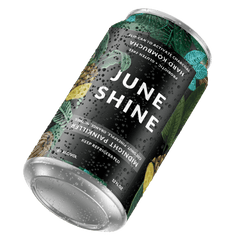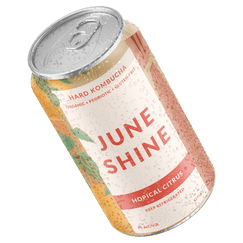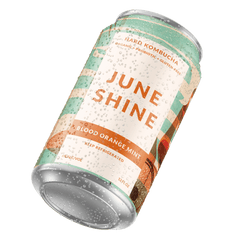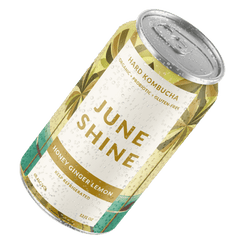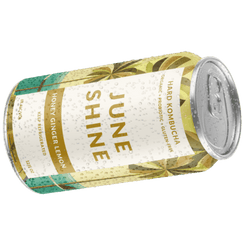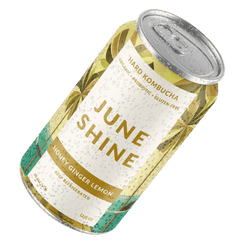Probiotic Tea: What's the Debate?

These days, probiotics are poppin’. They’re showing up in food and drinks everywhere, and they're believed to fight off bad bacteria in the body and improve digestive health. They’re like a microscopic buddy who’s looking out for you—almost like Osmosis Jones.
These microorganisms show up quite a bit in fermented foods like yogurt, sourdough bread, kimchi, and kombucha. In fact, kombucha is considered a probiotic tea! It’s just, like, way more delicious than any other probiotic tea you’ve ever tried.
Here’s the rough part: even though probiotic foods and drinks have a ton of health benefits, a lot of these products are actually filled with heavy sweeteners and icky additives. We say you should always check the ingredients list and nutritional facts of something before assuming that it’s good for you (if you already know it’s not good for you, that’s a whole other story—no need to check the nutrition panel on your Twinkie). If a brand is secretive about its ingredients, that seems a little suss to us.
Here at Juneshine, we believe our customers have the right to know exactly what they’re buying. We’re proud of our ingredients, so we’re gonna shout about them to the rooftops. When you hear about the organic ginger or the fresh blood orange that we’re using, you’ll know that hard kombucha is what you’ve been waiting for your whole life.
Before racing off to swipe your credit card for a bunch of flashy supplements, take a sec to educate yourself on what you’re actually buying. Not sure what you should be looking for when it comes to probiotics? We got you.
What Are Probiotics?
Before you start making it rain for any probiotic supplement, you should have a solid understanding of what probiotics are.
According to WHO, probiotics are “live microorganisms which when consumed in adequate amounts as part of food confer a health benefit on the host.”
That’s a lot of fancy science words that basically boil down to this: probiotics are a natural part of your body, and they can lend you a helping hand.
In the human body, there are two types of bacterias: helpful ones and not-to-helpful ones. Seriously, not all bacteria is bad. Probiotics are an example of a good bacteria that can help you.
There are a whole bunch of probiotics, but two commonly seen ones are Lactobacillus bulgaricus and Streptococcus thermophilus. These two bacteria, which pop up in yogurt, can help you digest lactose if you struggle with tummy troubles
Probiotics are the heroes of the gut. Some research even claims they can prevent cancer and heart disease, reduce blood pressure, and lower cholesterol, but we’re not sure about all of that. Either way, though, those probiotics have some good stuff going on.
With everyone claiming that probiotics are a godsend, it can be a little tricky to tell who’s telling the truth and who is cappin’. We want to be healthy, but we don’t want to fall for any whack misinformation. So what’s the truth when it comes to probiotics?
The Ins and Outs of Probiotic Tea
So, how does probiotic tea work? Just like all probiotics, probiotic tea boosts the amount of good bacteria in your gut. They help you digest foods better and… ahem, go to the bathroom more easily.
When bad bacteria start having a party in your stomach, you start to feel sick. On the flip side, the more good bacteria hanging out in your gut, the better your stomach will feel overall.
When you drink probiotic tea, beneficial bacteria square up with the harmful bacteria and start to populate your stomach, which can help you feel better overall.
Now that you’ve heard all about this miracle drink, you’re probably wondering how probiotic tea is made. It all comes down to SCOBY, AKA a symbiotic culture of bacteria and yeast.
Most probiotic products get all their healthy goodness through fermentation, when bacteria and yeast break down nutrients in food and drinks. During fermentation, you also get ethanol—which we like to call booze. You may have heard that kombucha is slightly alcoholic. We are confirming that awesome fact.
The amount of alcohol in standard probiotic tea isn’t enough to get you buzzed, but you might notice the taste a bit. Of course, if you’re choosing a product like JuneShine, you should be able to get a nice buzz because we make sure there’s just a bit more alcohol in there. Probiotics? Booze? Works for us.
How Does Probiotic Tea Taste?
Many probiotic teas feel like someone is throwing a party in your mouth—in other words, they’re real, real fizzy.
Probiotic tea has a tart, dry taste with a zesty feel. It’s almost like drinking a fruit tea, except way, way better (if it’s JuneShine, at least).
If we’re going to be talking taste, allow us to drop a couple of delicious flavors here. Imagine you’re chillin’ in the backyard, and you reach into your cooler to grab a Blood Orange Mint kombucha. Or Grapefruit Paloma. Or Hopical Citrus. We could keep going, but we don’t want you to get too jealous...
What’s the Tea on Natural Probiotics?
Probiotics can be divided into two categories: natural and supplemental. They’re pretty similar, so it’s really up to you which one to choose.
Natural probiotics get those health-boosting qualities from fermentation, while supplemental probiotics get all that good stuff thanks to additives.
Probiotic tea can swing either way, if you catch our drift, but JuneShine Kombucha is always natural.
Kick Back, Grab a Can, and Get to Loving Probiotic Tea
After all that, we’re pretty confident that we can say there’s no debate about what probiotic tea is the best—it’s obviously JuneShine.
There’s a lot going on out there when it comes to probiotic tea benefits, but we’re content to just know that we’re getting a lighter, brighter buzz. It’s all about taking it easy and enjoying the moment, all with a can by your side. Great vibes, full can, can’t lose.
Looking for a probiotic tea with some kick to it? Juneshine has your back!
Sources:
Digestive Health | Harvard Health
